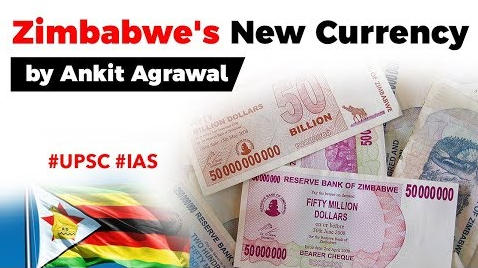Table of Contents
HISTORICAL BACKGROUND
- Zimbabwe has a troubled history with currency.
- Around 2009, hyperinflation destroyed the value of country’s currency Zimbabwe Dollars.
- At its height, prices were almost doubling every day and the reserve bank printed notes worth 100tn Zimbabwe dollars to try and keep up.
- Hence in 2009 it ditched the Zimbabwe dollar.
- The Zimbabwe dollar was replaced by a basket of multi-currencies which included-US dollar, the British pound, South African rand, Botswana pula, Japanese yen and the Chinese yuan.
- But the US dollar remained dominant currency.
SCARCITY OF US DOLLARS
- The Zimbabwe was continuously facing economic downturn and slow economic growth.
- This led the country to import huge amount of goods, in return it exported only few goods.
- To make payments for imports more US dollars were leaving the country.
- Thus the US Dollar became scarce over time.
- This led to long bank queues as people struggled to get their money out.
BOND NOTES AND BOND COINS
- In 2016, the government introduced bond notes and coins.
- These were supposed to be worth the same as the US dollar, to make up for the cash shortage.
- But no-one had faith that they were equivalent.
- Thus bond notes rapidly lost value against the dollar.
- The bond notes and coins were at par with the US dollar at their introduction but have over the years continued to lose value.
- Currently it is trading at around 14 to 1 US dollar.
NOW WHAT? RTGS DOLLAR?
- In February 2019, introduced- Real Time Gross Settlement.
- Since Zimbabwe used different currencies, customers were charged different prices depending on what payment method they chose.
- The RTGS dollar brought together bond notes, debit card and mobile money payments to make sure that they are all worth the same.
- Basically government wanted things priced in RTGS dollars, rather than US dollars.

- New currency would be introduced in a move set to curb current cash shortages in the country.



LEARNINGS FROM ZIMBABWE EXPERIENCE
- What makes a currency a currency?
- A currency is something that is widely accepted as a means to buy goods and services.
- Independent monetary policy?
- Multi-currency regime did not give control of monetary policy and left Zimbabwe at the mercy of US dollar.
- US dollar is so strong, producing goods in Zimbabwe was expensive which is why businesses prefer to import goods.
Latest Burning Issues | Free PDF



























 WhatsApp
WhatsApp